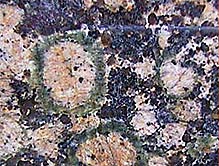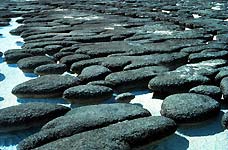     | ||
 |
Foundation
Subjects |
 |
|
Foundation Subjects provide the physical, biological, mathematical,
and political science foundation upon which the concentration is built. Students
will take all of the Foundation Subjects. In addition to MIT's Science
Core, these subjects include:
12.001 Introduction to Geology (Spring)  Major rock-forming minerals, rock-forming processes, and rock types. Geologic structures and relationships observable in the field. Geologic time scale, dating of rocks by fossil and isotopic methods. Sediment movement and landform development by moving water, wind, and ice. Crustal processes and evolution in terms of global plate tectonics. Geologic history of the continents, with emphasis on North America. Laboratories on minerals, rocks, fossils, and mapping. Two nonrequired one-day field trips. Major rock-forming minerals, rock-forming processes, and rock types. Geologic structures and relationships observable in the field. Geologic time scale, dating of rocks by fossil and isotopic methods. Sediment movement and landform development by moving water, wind, and ice. Crustal processes and evolution in terms of global plate tectonics. Geologic history of the continents, with emphasis on North America. Laboratories on minerals, rocks, fossils, and mapping. Two nonrequired one-day field trips.12.003 Physics of the Atmosphere and Ocean (Fall)  The laws of classical mechanics and thermodynamics are used to explore how the properties of fluids on a rotating Earth manifest themselves in, and help shape, the global patterns of atmospheric winds, ocean currents, and the climate of the Earth. Theoretical discussion focuses on the physical processes involved. Underlying mechanisms are illustrated through laboratory demonstrations, using a rotating table, and through analysis of atmospheric and oceanic data. The laws of classical mechanics and thermodynamics are used to explore how the properties of fluids on a rotating Earth manifest themselves in, and help shape, the global patterns of atmospheric winds, ocean currents, and the climate of the Earth. Theoretical discussion focuses on the physical processes involved. Underlying mechanisms are illustrated through laboratory demonstrations, using a rotating table, and through analysis of atmospheric and oceanic data.12.007 Geobiology (Spring)  The interactive Earth system: biology in geologic, environmental and climate change throughout Earth history. Since life began it has continually shaped and re-shaped the atmosphere, hydrosphere, cryosphere and the solid earth. Subject introduces the concept of "life as a geological agent" and examines the interaction between biology and the earth system during the roughly 4 billion years since life first appeared. Topics include: the origin of the solar system and the early Earth atmosphere; the origin and evolution of life and its influence on climate up through and including the modern age and the problem of global warming; the global carbon cycle; and astrobiology. The interactive Earth system: biology in geologic, environmental and climate change throughout Earth history. Since life began it has continually shaped and re-shaped the atmosphere, hydrosphere, cryosphere and the solid earth. Subject introduces the concept of "life as a geological agent" and examines the interaction between biology and the earth system during the roughly 4 billion years since life first appeared. Topics include: the origin of the solar system and the early Earth atmosphere; the origin and evolution of life and its influence on climate up through and including the modern age and the problem of global warming; the global carbon cycle; and astrobiology.12.102 Environmental Earth Science (Fall)  The geologic record demonstrates that our environment has changed over a variety of time scales from seconds to billions of years. Subject explores the many ways in which geologic processes control and modify the Earth's environment. Topics include: chemical and physical interactions between the solid Earth, its oceans and atmosphere; the effect of catastrophic events such as volcanic eruptions and earthquakes on the environment; geologic hazards; and our role in modifying the environment through earth resource development. This subject serves as an introduction to subject 12.120, which addresses field applications of these principles in the American Southwest. The geologic record demonstrates that our environment has changed over a variety of time scales from seconds to billions of years. Subject explores the many ways in which geologic processes control and modify the Earth's environment. Topics include: chemical and physical interactions between the solid Earth, its oceans and atmosphere; the effect of catastrophic events such as volcanic eruptions and earthquakes on the environment; geologic hazards; and our role in modifying the environment through earth resource development. This subject serves as an introduction to subject 12.120, which addresses field applications of these principles in the American Southwest.12.103 Strange Bedfellows: Science and Environmental Policy (Fall)  Explores the role of scientific knowledge, discovery, method, and argument in environmental policymaking from both idealistic and realistic perspectives. Case studies of science-intensive environmental controversies will be used to study how science was used and abused in the policymaking process. Case studies include: global warming, biodiversity loss, and nuclear waste disposal siting. Subject includes intensive practice in the writing and presentation of "position statements" on environmental science issues. Explores the role of scientific knowledge, discovery, method, and argument in environmental policymaking from both idealistic and realistic perspectives. Case studies of science-intensive environmental controversies will be used to study how science was used and abused in the policymaking process. Case studies include: global warming, biodiversity loss, and nuclear waste disposal siting. Subject includes intensive practice in the writing and presentation of "position statements" on environmental science issues. 18.03 or 18.034 Differential Equations (18.03: Fall, Spring; 18.034: Spring)  Study of ODE's, including modeling physical systems. Solution of first-order ODE's by analytical, graphical and numerical methods. Linear ODE's, especially second order with constant coefficients. Undetermined coefficients and variation of parameters. Sinusoidal and exponential signals: oscillations, damping, resonance. Complex numbers and exponentials. Fourier series, periodic solutions. Delta functions, convolution, and Laplace transform methods. Matrix and first order linear systems: eigenvalues and eigenvectors. Non-linear autonomous systems: critical point analysis and phase plane diagrams. (18.034 covers the same material as 18.03, with more emphasis on theory.) Study of ODE's, including modeling physical systems. Solution of first-order ODE's by analytical, graphical and numerical methods. Linear ODE's, especially second order with constant coefficients. Undetermined coefficients and variation of parameters. Sinusoidal and exponential signals: oscillations, damping, resonance. Complex numbers and exponentials. Fourier series, periodic solutions. Delta functions, convolution, and Laplace transform methods. Matrix and first order linear systems: eigenvalues and eigenvectors. Non-linear autonomous systems: critical point analysis and phase plane diagrams. (18.034 covers the same material as 18.03, with more emphasis on theory.)
|  | |
 |  |  |